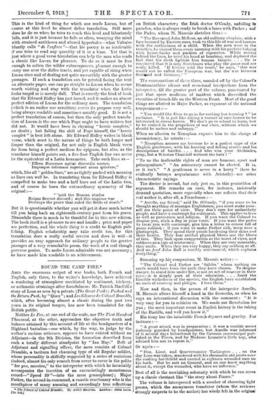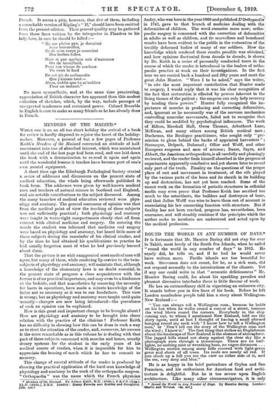ROUND THE CAMP FIRE.* AMID the enormous output of war
books, both French and English, only three, to the writer's knowledge, have achieved a rendering of atmosphere unvitiated by sentiment, trickery, or asthmatic strainings after forcefulness: Mr. Patrick MacGill's story of Loos as seen by a private (The Great Push); Pushed and the Return Push, by " Quex" ; and Les Silences the Colonel Bramble, which, after becoming almost a classic during the past two years in its original tongue, has now been translated for the British public.
Neither Le Feu, at one end of the scale, nor The First Hundred Thousand, at the other, approaches the • objective truth and balance attained by this account of life at the headquarters of a Highland battalion—one which, by the way, to judge by the author's curious reticence, appears to have existed without an Adjutant—in the 9th Division, the formation described from such a totally different standpoint by " Ian Hay." Ref t of Adjutant and signalling officer, the mess consists of Colonel Bramble, a taciturn but charming type of old Regular soldier, whose personality is skilfully suggested by a series of omissions (indeed, almost his only remark from cover to cover is the polite "for you, messiou," to the interpreter with which he invariably accompanies the insertion of an excruciatingly monotonous record—" Speed 59 "—into the mess gramophone) ; Major Parker, the second-in-command, a caustic reactionary who is the mouthpiece of many amusing and exceedingly true reflections
• The Silence of Colonel Bramble. By Andre Maurois. London: John Lane. [5s. net.,1
on British character ; the Irish doctor O'Grady, unfailing in paradox, who is always ready to break a lance with Parker ; and the Padre, whom M. Maurois sketches thus :-
" The Reverend John McIvor, an old military chaplain, with a face bronzed by Eastern suns, took to this life of war and horrors with the enthusiasm of a child. When the men were in the trenches, he visited them every morning with his pockets bulging with hymn-books and packets of cigarettes. While resting behind the lines, he tried his hand at bombing, and deplored the fact that his cloth forbade him human targets. . . . He is convinced that it is only Scotchmen who play the game and are really killed. ' If history told the truth,' he says, ' this war would not be called the European war, but the war between Scotland and Germany.' " Tie conversations of these three, rounded off by the Colonel's Rhatiamanthine silence and occasional interjections from the interpreter, fill the greater part of the volume, punctuated by just that spare modicum of incident which diversified the eternities of trench-life on the Western Front. Most of the good things are allotted to Major Parker, as exponent of the national temperiment :- " You would like Eton to go in for nothing but learning ? " he exclaims. " It is just like asking a trainer of race-horses to be interested in circus horses. We don't go to school to learn, but to be soaked in the prejudices of our class,. without which we should be useless and unhappy."
When an allusion to Xenophon exposes him to the charge of inconsistency, he retorts :—
" Xenophon amuses me because he is a perfect type of the English gentleman, with his hunting and fishing stories and his descriptions of battles.. . . And who was your Alcibiades, pray, but a Winston Churchill without the hats "
" To us the inalienable rights of man are humour, sport and primogeniture." " An aristocracy cannot be elected. It is, or it isn't." " A gentleman is never in a hurry " (hero he evidently betrays acquaintance with Aristotle)—are other characteristic sayings.
The doctor is second, but only just so, in this pentathlon of argument. His remarks on cant, for instance, insistently demand quotation, more especially when one reflects that their real author is, after all, a Frenchman :—
" Aurelle, my friend," said Dr. O'Grady, " if you want to be thought anything of amongst Englishmen, you must make your- self see their point of view. They don't care for melancholy people, and have a contempt for sentiment. This applies to love as well as patriotism and religion. If you want the Colonel to despise you, stick a flag in your tunic. If you want the padre to treat you with contempt, give him a letter to censor full of pious rubbish : if you want to make Parker sick, weep over a photograph. They spend their youth hardening their skins and their hearts. They fear neither physical blows nor the blows of fate. They look upon exaggeration as the worst of vices, and coldness as a sign of aristocracy. When they are very miserable, they smile. When they are very happy, they say nothing at all. And au fond John Bull is terribly sentimental, which explains everything."
Summing up his companions, M. Maurois writes :-
" The Colonel and Parker are Sahibs' whom nothing on earth would turn from the path they have chosen. To despise danger. to stand firm under fire, is not an act of courage in their eyes—it is simply part of their education. . . . Amid the horrible wickedness of the species, the English have established an oasis of courtesy and phlegm. I love them."
Now and then, in the person of the interpreter Aurelle, M. Maurois allows himself a hand in the fireworks, as when he caps an international discussion with the comment : " It is very easy for you to criticize us. We made our Revolution for you ; the most important event in English history is the taking of the Bastille, and well you know it."
His irony has the inimitable French dryness and gravity. For instance :-
" A great attack was in preparation ; it was a terrible secret jealously guarded by headquarters, but Aurelle was informed of it several days beforehand by the German communiqué pub- lished in the Time-s, and by Madame Lemaire's little boy, who advised him not to repeat it."
Or again :— " Hon. Lieut. and Quartermaster Tarkington . . . on the day Loos was taken, wandered with his rheumatic old joints over the soaking battlefield and carried in eighteen wounded men on his back. But he met no General, and no one knew anything about it, except the wounded, who have no influence."
Best of all is the unwinking solemnity with which he can serve up a classic chestnut like " the story about Frazer."
The volume is interspersed with a number of charming light poems, which the anonymous translator (whom the reviewer strongly suspects to be the author) has wisely left in the original French. It seems a pity, however, that five of them, including a remarkable version of Kipling's " If," should have been omitted from the present edition. Their general quality may be gathered from these lines written by the interpreter in Flanders to his lady-love, in case he should be killed :-
" .Ne me plains pas, je dormirai sans barcarolles,
Et de mon corps je nourrirai Des herbes folles.
Mais si par quelque soir d'automne Ou de brouillard, Pour ton visage de madone Tu veils le fard De cet air de melancolie Que j'aimais tent- Alors, oublie que to m'oublies Pour un instant."
No more sympathetic, and, at the same time penetrating, appreciation of British character has appeared than this modest
collection of sketches, which, by the way, include passages of unexpected tenderness and restrained power. Colonel Bramble in English is sure to make as many friends as he has already done in French.















































 Previous page
Previous page